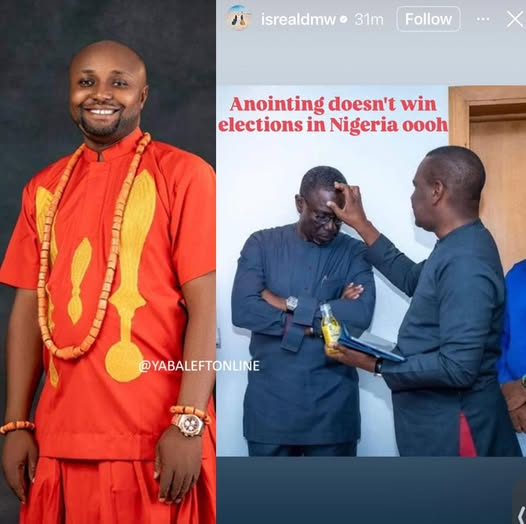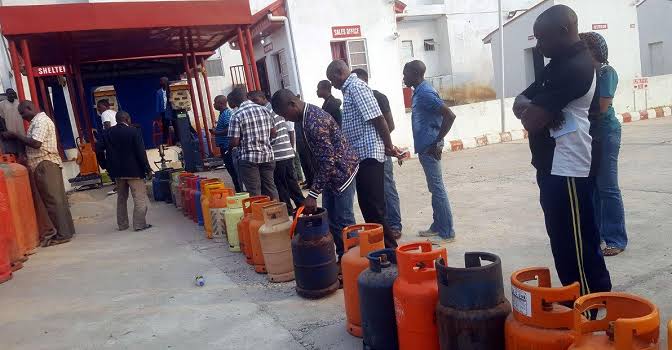
“Anointing No Dey Win Election for Nigeria” – Israel DMW Reacts to PDP’s Ighodalo Supreme Court Defeat as APC’s Okpebholo Emerges Edo Governor

In a sharp and unapologetic reaction to the latest Supreme Court verdict in Edo State’s gubernatorial race, Israel DMW, the personal logistics manager to Nigerian superstar Davido, has stirred controversy online after commenting on the judgment that saw the People’s Democratic Party (PDP) candidate Asue Ighodalo lose to the All Progressives Congress (APC) candidate, Senator Monday Okpebholo. The outspoken aide didn’t mince words, declaring on his social media platform that “anointing doesn’t win elections in Nigeria o,” a bold statement that has sent shockwaves across political and religious circles alike.
The Supreme Court, in a final ruling that left no room for further legal contestation, affirmed Senator Monday Okpebholo as the legitimate candidate and recognized his victory as Edo’s incoming governor. The judgment puts an end to the heated legal battle between the APC and PDP over who would be the rightful torchbearer for the governorship election. Asue Ighodalo, a respected lawyer and technocrat who was seen as the 'chosen one' by key stakeholders in the PDP and reportedly had the backing of the outgoing Governor Godwin Obaseki, suffered a significant blow with this outcome. Many within the political sphere had expected a different result, especially given the wide network of support he reportedly enjoyed within the state.
However, Israel DMW’s comments didn’t focus on legal technicalities or campaign strategy. Instead, he hit a deeper and more controversial chord — the perceived overreliance on "anointing" and divine endorsement as a guarantee of political victory in Nigeria. In a country where religion and politics often intertwine, and where candidates are frequently ‘anointed’ by spiritual leaders in high-profile church services or rallies, his statement landed like a sledgehammer. “You fit get all the anointing, but na ground game dey win election,” he added in a follow-up post, implying that political structures, grassroots mobilization, and party strategy outweigh spiritual endorsement when the chips are down.
The social media space immediately erupted with mixed reactions. While some users praised Israel for “saying the bitter truth,” others criticized him for what they called “disrespecting the spiritual dimension of leadership.” Among his supporters were political commentators who argue that many politicians have weaponized religion to manipulate the electorate, often appearing more in churches than in campaign grounds. “You can’t pray your way to a government house,” one user replied in agreement. Another said, “We need competence, not holy water campaigns.”
On the other hand, critics called his comments insensitive, especially considering the emotional investment many of Ighodalo’s supporters had in the race. Several faith-based communities had openly backed the PDP candidate, organizing prayer walks and spiritual interventions for his victory. To them, Israel’s post came off as a mocking dismissal of their efforts. A clergyman from Benin who chose to remain anonymous stated, “While strategy matters, mocking the role of prayer is unfortunate. God still rules in the affairs of men.”
Meanwhile, political analysts have begun dissecting the implications of the Supreme Court’s ruling and what it means for the future of Edo politics. Senator Monday Okpebholo, widely regarded as a grassroots politician with deep ties to rural communities in the state, has consistently emphasized his connection with the ordinary people. Many believe his appeal lies in his humble beginnings and long-standing presence in Edo political corridors, rather than any elite endorsement. His emergence signals a shift in political power from the technocratic, Obaseki-style governance to a more populist approach that prioritizes local needs and visible action.
Asue Ighodalo’s camp, while gracious in defeat, expressed disappointment over the outcome, stating that their focus was always on presenting a candidate with the capacity to lead Edo into a future of innovation and reform. Nevertheless, many observers believe that the internal wrangling within the PDP weakened their chances, with reports of discontent among party loyalists over Ighodalo’s emergence at the primaries. Some critics argued that the PDP underestimated the strength of APC’s political machinery and over-relied on the influence of Governor Obaseki’s endorsement.
For Israel DMW, however, the verdict was simply a confirmation of what he’s long believed about Nigerian politics. “Na person wey dey street go understand,” he wrote, stressing that political survival in Nigeria is less about divine favor and more about strategic alignment, loyalty networks, and financial war-chests. Though known more for his comic commentary and celebrity lifestyle, Israel’s take has reignited serious debate about the place of religion in politics, especially in a time when political endorsements are increasingly accompanied by prayer sessions, fasts, and declarations.
This is not the first time religion has played a central role in Nigeria’s political theater. In past elections, candidates from all levels have flocked to churches and mosques seeking blessings, photo ops, and declarations from men of God. These religious appearances are often used to project humility, spirituality, and a connection with the divine — traits that appeal deeply to a population that is among the most religious in the world. But critics argue that while prayer can inspire hope and encourage moral leadership, it is no substitute for robust political strategy, grassroots work, and effective governance.
With the Supreme Court’s ruling now behind them, both APC and PDP must look ahead. For Monday Okpebholo, the task of uniting a divided state and proving that he is not just a candidate of political luck lies ahead. For Asue Ighodalo, it may be a moment of introspection and recalibration as he considers his next political move. But for social commentators like Israel DMW, the lesson remains clear — Nigeria’s elections are won not in pulpits or prayer camps, but in the trenches, the streets, and the strategy rooms.
As the dust settles and Edo gears up for a new administration, one thing is certain: the conversation about faith, politics, and performance will continue to echo far beyond this election cycle. Whether or not you agree with Israel DMW’s blunt assessment, his words have peeled back a layer of political theater that many are too polite to discuss. And in a country where perception is everything, sometimes the loudest voice doesn’t come from the pulpit — it comes from a logistics manager with a smartphone and a fearless tongue.


